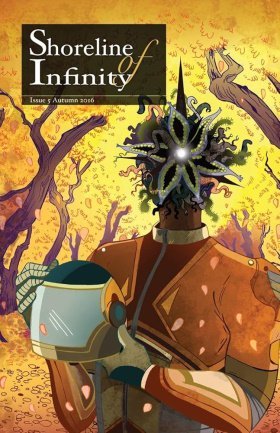“Sure.” he replied.
“Are we still set to go?” Melano asked.
“100%” he said, laying a bulging, sweat soaked arm round Phjolca’s shoulders. “We’ve got the gear, you just bring the party.”
The ball fell from the score box and landed in his outstretched palm.
Thought jolted. Falling.
“Why the fuck did it have to bring us up so fast?” Melano groaned.
I floated in the display loom, feeling sick to my bones, studying a multi-spectrum analysis of the system’s three major planets. Coltrane was the only one shown in any great detail; the data from our preliminary fly-by now augmented with realtime sensor coverage. It was a sub-giant gas planet of little distinction.
“Because if it didn’t, you’d probably go mad before you woke up.” I replied. I zoomed into the simulation of Coltrane; laughed:
Coltrane had three moons, the largest of which was named Cannonball. Cannonball was composed almost entirely of iron. Even computers had to have a sense of humour.
“So?” asked Melano, impatiently.
“Nothing to write home about. No sign of anything that might have been responsible for the missing log data. Nothing even plausibly man-made in Coltrane’s atmosphere or on any of the moons; if Tjssin was here, he didn’t leave much for us to go on.”
Melano leaned into the vibration field; panned in on Cannonball’s rusted surface.
“Maybe that was his plan.”
“I don’t think so. Why have us chase him halfway across the galaxy just to hide in a hole in the ground? There must be a thousand places he could stay hidden down there for the next million years, if he really wanted to, but I don’t think that’s his style.”
Melano amped the mag to max, bringing Cannonball’s pockmarked face into high relief.
“There’s nothing on the scan?”
“Nothing. I don’t know. It just doesn’t feel like the place.”
“You and your feelings.”
“I think he’s here. In the system. But not here.”
“You dreamt?”
I nodded slowly.
“He’s here.”
We who are reborn, regenerated, recycled through the eye of the quantum needle, come to share a certain bond. An affinity with the void that births us. Entangled.
It’s hard to describe. You can think of a mind as a complex quantum phase state. Given enough dimensions, an entire personality can be encoded as a single informational matrix. That’s how coldtime works. But when a mind is compressed to the point of geometry—when it slips outside of time and space, and more importantly, when it comes back again—it begins to pick up resonances: structural commonalities; shared memories, feelings. Things become blurred.
It’s hard to describe. Some are more sensitive to it than others. Melano, for instance, barely blinks. But some of us feel it deep. It comes to us in the quiet places between thoughts, when we are closest to the void.
Into sleep, come dreams.
Phjolca crouched by the skylight, her absolute concentration fixed on the laser cutter in her hand. The cutter inserted a reflective filament into the glass as it went, ensuring that the security beams within the pane would continue to believe that it remained unbroken even as the centre portion was lifted clean out.
She insisted on doing it freehand; three sides were now cut away and she was half way through the fourth without incident. I was quietly impressed.
Our disembodied heads bobbed waist-high behind a rattling ventilation duct, camo-suits mimicking the dull gradient of weathered steel. We had all removed our masks to better breathe in the sultry city air; there were no cameras nearby.
Of course, they could easily have laced the whole compound with the sort of nanoscale surveillance dust that would have rendered any intrusion almost impossible, but the people of Aurelia valued their privacy. They valued it enough to have well enforced laws which ensured that the manufacture and use of such nanotechnologies was severely punishable. This small fact had been a not insignificant consideration in the planning of our visit to the system.
Phjolca killed the laser tool and carefully lifted the centre of the skylight out by the suction pads attached at the corners.
“Whenever you’re ready.” Tjssin crooned, pulling the featureless fabric down over his smooth chin.
We left Coltrane behind for the second time, this time falling inward against the pressure of Gillespie’s feeble rays.
We slept; woke. Dreamt.
Parker loomed massive, blue and green in our field of view. The colour was amplified, but true to life. I realised with unease that I had known it would be blue and green, long before the computer had calculated its exact chemical composition.
“Fourteen moons. Only four of them more than a thousand clicks across.” said Melano, reading from the simulation.
The numbers were eerily familiar. What was stranger, so were the names:
Mingus.
Pastorius.
Evans.

























